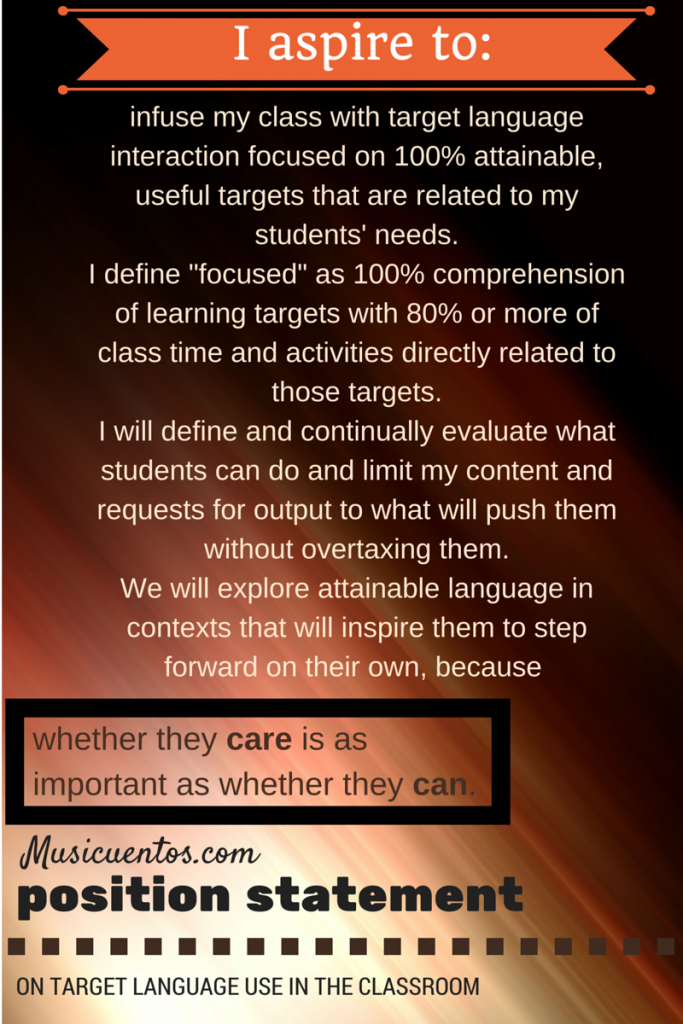Quiz for you: What percentage of target language use does the American Council on the Teaching of Foreign Languages recommend teachers and students use in the classroom?
Almost every teacher I know and work with can answer this question. How could we not when it becomes such a torment for so many? Answer: 90% or higher.
Next question: Why? Where did this magic number come from?
Last year, I had a most stunning conversation in which someone told me where the 90% in the ACTFL position statement on target language use in the classroom came from. Caveat: I wasn’t able to verify this information in any online source, and I did look, but I’ll tell you that it came from one of the people involved in producing the position statement, so I feel comfortable blogging about it. (If you have different information, please offer it in the comment section below or to me in email.)
ACTFL leadership knew they wanted to develop a position statement asking teachers to increase the level of target language they were using in the classroom. A very worthwhile endeavor, to be sure; in my first three years of teaching, I probably used Spanish in class about 5% of the time, and most of that was reading questions and answers out of the textbook. But what number? How to find out? To come up with a percentage, ACTFL surveyed teachers. As the surveys came back, said former ACTFL leader, they kept seeing the number should be 90%.
It came from surveys?
I suppose I had assumed it was much more… scientific than that. Wasn’t there a research project done? Some published paper that told us how much students needed to hear? You mean that the number so many teachers fight with is based on surveys?
 But it makes some sense, does it not? I’m not sure how else we’d come up with it. My 90% doesn’t add up to as many minutes as yours does. You can do 90% with the second graders you see for 20 minutes per week and they still won’t show significant proficiency gains. And of the 90%, how much needs to be comprehended? Clementi and Terrill tell us “Don’t confuse comprehensible input with 100% comprehension.” No number on that. It couldn’t have been a research project that came up with 90%.
But it makes some sense, does it not? I’m not sure how else we’d come up with it. My 90% doesn’t add up to as many minutes as yours does. You can do 90% with the second graders you see for 20 minutes per week and they still won’t show significant proficiency gains. And of the 90%, how much needs to be comprehended? Clementi and Terrill tell us “Don’t confuse comprehensible input with 100% comprehension.” No number on that. It couldn’t have been a research project that came up with 90%.
Do you see what I mean here?
A research project designed to test what percentage of comprehensible target language use results in proficiency gains in a classroom setting involves so many undefinable terms and so many unanswerable questions and so many unavoidable variables that in practical terms it is impossible to do scientifically.
What do you think? What about the problem of actually defining comprehensible input and measuring how many of the students comprehend each utterance? What about issues in working memory, short-term memory, and long-term memory, and which actually constitutes proficiency gains? What about such overwhelming issues as keeping track of when a student is absent from class and how that reduces the number of minutes that individual student received and thus skews the data? What about measuring whether or not each individual student is paying attention every single minute you’re counting as comprehensible target language? Impossible.
But really? The number we talk so much about is… well, arbitrary? And when you check the position statement, the number is (in parentheses). The actual position is “as exclusively as possible (90% plus).”

Want to go further into the complications? Here’s my problem with equating comprehensible input with 100% comprehension: I can’t do it with students who have no language without being unnatural. I can’t contrive it and keep them engaged. I have seen presenters do this successfully. But not with students, personally. I’ve seen it successful with teachers who love teaching language and are geared to language and who paid to be there so they are inclined to be engaged anyway. And I’ve only seen it done by people I could describe with the phrases “stand-up comedian” and/or “energizer bunny” and/or “person who has been doing this demonstration for 20 years.” It looks exhausting. I can’t do it. So what can I do? What works for me?
This is a wall of text already, and I’ll take a break to tell you the purpose of this thought process and post is to show you how I decided to develop a position statement that worked for me and my students in my classroom and I’d love to see you do the same and share it on your own blog, here in the comments, or with me via email. But first, let me briefly explore two directions I have been before and did not want to go.
Charlie Brown’s teacher: X% TL with little attention to comprehensibility
 I’ve heard many colleagues talk about jumping on board with using 90% or higher target language without paying too much attention to whether or not – or how much – students were comprehending. And boy, have I done this too! But saying “90% target language” isn’t really an accurate summary of the ACTFL recommendation. From the position statement,
I’ve heard many colleagues talk about jumping on board with using 90% or higher target language without paying too much attention to whether or not – or how much – students were comprehending. And boy, have I done this too! But saying “90% target language” isn’t really an accurate summary of the ACTFL recommendation. From the position statement,
a variety of strategies to facilitate comprehension… provide comprehensible input… make meaning clear… conduct comprehension checks… teach students strategies for requesting clarification…
I tried this before, specifically my first year teaching elementary school after all my training was in secondary. I’d just come out of discovering the input hypotheses in grad school and thought if I just told the story of The Very Hungry Caterpillar enough times that acquisition would happen. (It didn’t.) Now, in my journey to develop Russian skills for demonstrating CI strategies, I’ve been reminded just how much clarification and simplicity have to be a part of what we do in order for people to understand.
So my question now is not:
How much target language can I use?
but rather:
How much target language can I help them understand, and how?
X% TL with little attention to targets
Children acquire language naturally without anyone paying too much attention to what we teachers call target structures, target vocabulary, lesson goals, etc. I can say with a lot of confidence that that is not going to happen with your students. It’s not and I know it’s not for one simple reason: there is not enough time. It’s no secret that I’m a big fan of patterning input (far more than most CI teachers) and using strategies like diagrams and changing marker colors to focus student attention on those patterns. I think this is the best way I’ve implemented to fight our time problem. Now, I have targets, and they’re directly related to ACTFL proficiency standards. In my novice units, we’re going to be regularly seeing patterned comprehensible input on (what some might pejoratively call sheltered) novice-level goals: talking about my likes and dislikes, giving biographical information, engaging in a conversation about activities or plans.
Why? Because:
Unless my students are growing up to be native speakers within the target-language culture, which they most certainly are not, why should I make my teaching match the input that produces that kind of speaker?
It’s a can of worms, I get it. I’m in a place where I’m okay with that. Because this is my position statement, not yours, and not his, and not theirs over there.
Speaking of which…
The Musicuentos position statement on TL use
I’ve thought about the wording here for a long time. I wanted something deeper than comprehensible because I wanted to emphasize realistic targets that are within students needs. I kicked around “apprehensible” because it’s related to aprender (Spanish: “to learn”), and I wanted it to be able to be comprehended and learned but then it turned out apprehensible just means comprehensible. Then I contemplated “learnable” but it still wasn’t quite what I wanted. So I landed on attainable.
In a graphic:
That text again:
I aspire to…
infuse my class with target language interaction focused on 100% attainable, useful targets that are related to my students’ needs. I define focused as 100% comprehension of learning targets with 80% or more of class time and activities directly related to those targets. I will define and continually evaluate what students can do and limit my content and requests for output to what will push them without overtaxing them. We will explore attainable language in contexts that will inspire them to step forward on their own, because whether they care is as important as whether they can.
Do I think this should be your position statement? ABSOLUTELY NOT. If I’ve learned one thing from all the arguments and fuss about what comprehensible means, what’s compelling, what’s acquisition, what percentage, how to hit the percentage, and so on, it’s that
people are different
and the more we lie to ourselves that they’re not, the more frustrated we’ll be in this profession. So now I advocate that you 1) reflect on yourself, 2) reflect on your school and your students and their goals, and 3) formulate your own position statement.
What do you aspire to?





Dear Sara Elizabeth, thank you for your article. I have always hated a number being imposed on a teacher. I think it could be dangerous, especially in the hands of an administrator who doesn’t really understand the culture. I have seen inner city schools where you’re lucky if the student is participating even some of the time, no matter how engaging and creative a teacher is. I have also seen presenters saying, “You have a 60 minute period, you can’t speak English more than 6 minutes,” and imply that the teacher is ineffective if s/he does. My philosophy is to use the target language as much as possible and there is always room for improvement. ‘Nuff said!
Thanks for your thoughts, Emily! I’m a firm believer that one size almost never fits all.
Hi Sara,
Thank you so much for this thought provoking post! I decided to make it my professional goal this past year to conduct my classes 90% in the TL ALL year, rather than petering out sometime late fall- this following 70-80% previously (keep in mind I teach K-4, elementary). What did I find? It can be done- but this was the most exhausting year of my 23 yr career, and no amount of coffee or chocolate can make it otherwise. Making my lessons comprehensible required mental gymnastics beyond my expectations- and not in regards to my ability to speak Spanish but rather to break it down enough to be comprehensible (learnable-love that word!). I was even more physically engaged than ever, going from kiddo to kiddo demonstrating what to do taxed me incredibly- I’m no longer in my 20s and able to sing ‘Head, shoulders, knees and toes’ a bazillion times a day! On the flip side, I found greater gains in my kiddos, especially at the earliest ages, than ever before, and I had been quite happy with my students previously! And, I didn’t find ways to give myself an “out” for activities that I had thought HAD to be done in English.. sure, I had to modify, alter, and change my expectations, but I discovered a lot about how I can make my lessons accessible to my students.
Regarding your thoughts about language acquisition, student learning, and realistic expectations in relation to time confines, I think you are right on! It has been a long standing beef of mine that many teachers assume students can learn a FL just like they learned their native language, or like one can in an immersion setting abroad. Though we can learn much from native language acquisition, it can only take us so far.
Lastly, I am so curious to hear more about your journey learning Russian through CI. Russian was my major, and I taught for over 13 years. I made it as comprehensible as possible, but it is so different from romance languages, and , especially in regards to its grammar, is just not intuitive for native English speakers. Keep posting about it!
Wishing you well, and kudos to your courage in posting something that is, in some ways, at odds with commonly held beliefs!
Julie
Mundo de Pepita
Thanks so much for your thoughts, Julie – I always come away a better teacher for my discussions with you!
I’m so intrigued that you taught Russian. I am still somewhere between NMP and NL- but I’m on a journey. I knew I needed a lesser-known language for CI demonstrations so that’s my primary purpose but hey, I could end up communicative. And I don’t know that I’m learning Russian “through CI” but I also don’t know if I’m capable of learning through CI i.e. natural acquisition. On this end of learning languages and getting an M.A. linguistics my first instinct is to deconstruct every word into its bits and guess and analyze how it might be reconstructed to form something else. I’m pretty sure not many people would call that natural, ha!
Sara,
That’s the interesting thing, and why I am so curious about your journey with Russian! I first experiences with it were traditional, aka the grammar approach. Since I am a grammar nut, this suited me very well- for me, grammar is like a puzzle that I just can’t wait to solve, and is endlessly fascinating- Russian satisfied that part of me, and surpassed it lol! I spend a semester in Moscow, during which, like every exchange student, I found I was lacking in a lot of skills- but, I also found that the grammar rules I had learned really helped me! Now, I do not want this to sound like I think we should turn back the clock and go back to a grammar approach! Just sharing my personal experiences- what truly moved me forward to proficiency and ultimately fluency, both with Russian and Spanish, was conversing with native speakers, ones who were and are willing to correct me, ones who are willing to answer all my questions, and truly are interested in helping me! Those conversations, along with reading, reading, reading, and yes, continuing to study grammatical points, is what has worked for me. A blend of CI, traditional methods, immersion, caring teachers/friends, and a boatload of work on my part! What does this have to do with our classes- honestly, just what you wrote! We need to be realistic about what our students can achieve, do as much as we can for them while we are together, and hope that in their adult lives the interest we have sparked (fingers crossed) will inspire them to continue their language learning journey!
Here’s another application that some teachers and I were just discussing at Camp Musicuentos. At what point do you introduce grammar explanations into the class? I told them that, for instance, the past subjunctive: no way are our students in AP Spanish going to get enough natural exposure to the past subjunctive to be able to use it on the exam. On the other hand, kids who hang around that long are often ready to actually implement a grammar explanation. So I explain it, for a few minutes, and then highlight for several seconds (“how/why is this fuera and not fue?”) when it comes up. That’s all. But the other issue is a question I have following the opinions of the researcher Robert DeKeyser: If a structure like that can be learned explicitly (as I did learn it) and can be used in communication so it almost looks implicit (as I can now regularly produce the structure on the fly but after explicitly thinking through the formation of it), then why does it matter whether it was learned or acquired?
Exactly! Your example is a perfect one; and, I will add, as teachers and/or speakers of a second language, we continue to utilize those strategies and skills that we learned to hone our own proficiency. Though I would love to say that I never translate in my head, or go back to a grammatical rule to know how or what to say, it isn’t true. I still look up things in the dictionary, I still consult a textbook to determine an ending or which preposition to use, and I think it is unfair of us to somehow expect our students to do what we are ourselves do not do exclusively. Regardless of how it gets into the brain, if it can then be used, by whatever thought process is necessary, then we are serving everyone better if we allow for a wider range of professional thought and action as opposed to a narrower definition that may, in the end, have some drawbacks. I really appreciate your thoughts and perspective on this- it is a breath of fresh air to consider and think about a wider dialogue!
[…] for the first time, the timing (and titling) of a post here is due to a powerful post by my friend and #TeamBlackBox colleague Sara-Elizabeth Cottrell. This week, Sara-Elizabeth […]
Sara-Elizabeth–
This is probably one of the best posts I have read in a while. It captures so much of what recent conversations have been about, where my mind has been wandering and pairs all of that with an action item. They say that if you write down a goal your brain thinks you have already reached it, so I would think that writing a position statement like this would be the same. It is certainly something to do to hold one’s self accountable for target language teaching and how that will look in class.
You have made me really think more deeply about some things that have been swimming in my head for months. Thank you for writing this and refocusing my own thoughts. I will let you know what my position statement is when I draft it!
Hugs from TX,
@alenord
“They say that if you write down a goal your brain thinks you have already reached it” – that makes SO much sense! Thanks for your thoughts as always, amiga.
[…] of Sara-Elizabeth, her post on target language is well researched and thoughtful. I highly recommend reading […]
[…] via My own position statement: the why & how of TL use | Musicuentos […]
[…] just blogged about my personal position statement on TL use in the classroom. I recommend you figure out where you stand on this one. This is one of the strongest points of […]
[…] Or 90% of the time. I am really okay with about 80% of the time as a target (especially since, as Sara-Elizabeth notes here, that the 90% statement from ACTFL is really an arbitrary number made up that sounded pretty good […]
Dear Sara-Elizabeth,
I found your article very interesting. I, too, have been searching for the research basis that resulted in the selection of 90% TL for ACTFL’s guideline. I have read many of the articles ACTFL cites supporting this guideline, but I’m not sure 90% is mentioned anywhere.
Right now, I’m carrying out some classroom-based research on how 90% TL looks (sounds, and works!) in the classroom, and what the learners think about it. If you have any further ideas on this topic you’d be willing to share, I’m all ears 😉
Thanks-
Rachel
Hi Rachel, thanks for stopping by! You had me at “classroom-based research.” 🙂 I would suggest you reach out on Twitter with the hashtag #langchat – there are a lot of teachers there that I think would love to hear more about what you’re investigating, and so would I!
[…] just blogged about my personal position statement on TL use in the classroom. I recommend you figure out where you stand on this one. This is one of the strongest points of […]